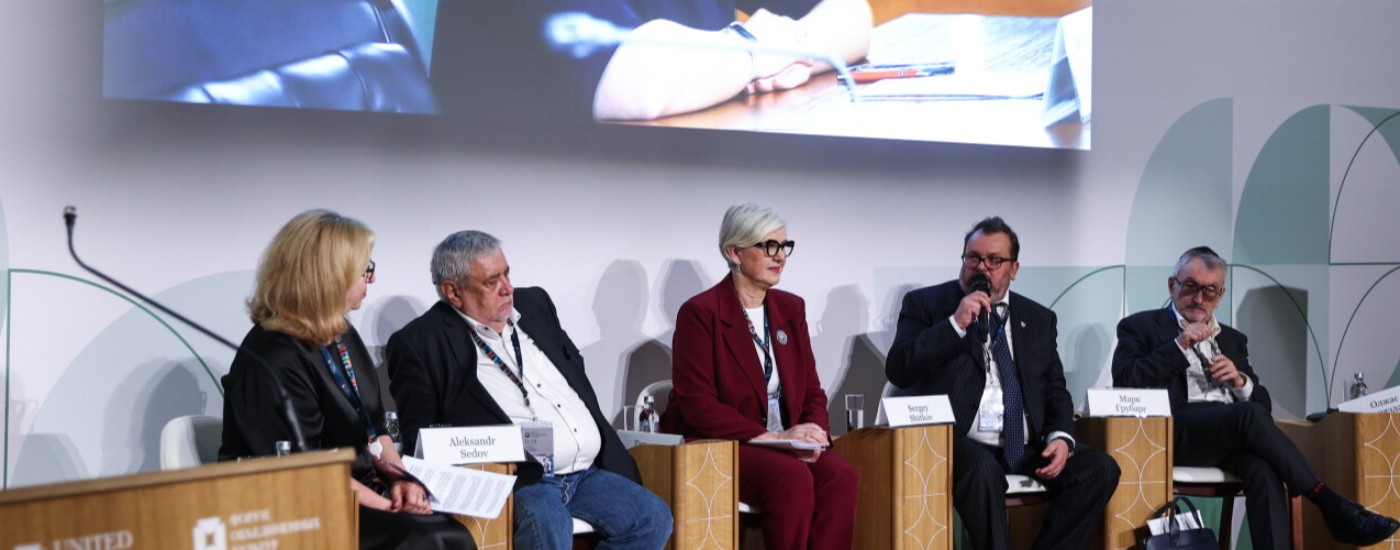The Forum hosted a panel discussion titled Shared Cultural Heritage: An Investment in the Future, held within the thematic session Cultural Heritage: Traditions and Modernity.
Speakers discussed the preservation of global cultural heritage and international cooperation to develop new ways of bringing heritage objects, traditions, and the histories of peoples to life. The discussion featured Mark Grubarg, Chairman of the Jewish Community of the St. Petersburg Grand Choral Synagogue and Chairman of the Council of Community Chairmen of the Federation of Jewish Communities of Russia; Alexander Sedov, Doctor of Historical Sciences and Director General of the State Museum of Oriental Art; Sergey Shitkov, Acting Rector of the Diplomatic Academy of the Russian Ministry of Foreign Affairs; Olga Starostina, Head of Research at the Russian Museum of Ethnography; Tatyana Rybkina, Director of the All-Russian Museum of Decorative Arts; and Olzhas Shariyazdanov, Deputy Director General of the Kazrestavratsiya RSE.
Participants will analyze the significance of joint cultural heritage in the modern world as a channel of cultural diplomacy and communication, and as a tool for constructing and maintaining historical memory and intercultural dialogue.
“There are two very important storylines, as I see it. The first is to inspire wonder. Peter the Great, the founder of museum work in Russia, said he wanted the public to marvel and to learn. The second point is about young people, about the public who make this cultural heritage their own through their interests, their questions, their active engagement. Shared cultural heritage certainly differs from other phenomena of the cultural world in that it absorbs the participation of very different social groups. Efforts to promote and interpret cultural heritage are becoming highly public. This brings risks, because stepping into the spotlight is always challenging, but it also creates opportunities,” noted the session moderator, Yulia Kupina, Director of the Russian Museum of Ethnography.
The discussion was developed by Alexander Sedov, Director General of the State Museum of Oriental Art: “Curiosity is an inherent human trait. What is it like in another place, in that far corner, and how does it compare to us. That is exactly how our museum operates, on human curiosity.”
Participants analyzed the significance of joint cultural heritage in the modern world as a channel of cultural diplomacy and communication, and as a tool for constructing and maintaining historical memory and intercultural dialogue.
“What matters most to me is that in a single talk, in reflections on policy, education, and youth, there are many emotional notes. Cultural heritage today influences people’s spiritual life, their psychology, their behavior, their emotions, their feelings, and the way they make decisions,” said Mark Grubarg, Chairman of the Jewish Community of the St. Petersburg Grand Choral Synagogue.
During the discussion, participants also considered the role of cultural heritage in shaping new social initiatives and solutions for constructing a harmonious future, and they shared plans for the coming year.
“This is indeed a landmark year for us at the Russian Museum of Ethnography, because we have set our sights high. We have joined forces to present the full diversity of culture, heritage, and traditions of the many ethnic groups that have lived in Russia throughout its history,” stated Yulia Kupina.






